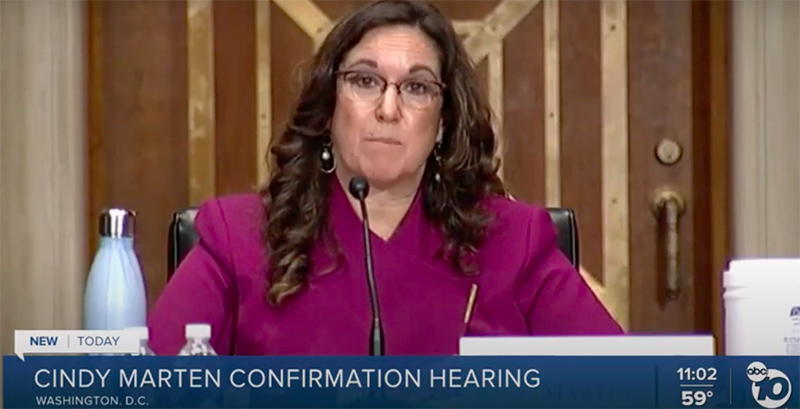Marten Faces Tough Questions on Reopening Schools Before Senate Committee, But Few Obstacles to Nomination as Deputy Education Secretary

Updated, May 11
The U.S. Senate voted 54-44 Tuesday to confirm Cindy Marten as the deputy secretary of education. The San Diego schools chief will be Education Secretary Miguel Cardona’s second-in-command at the U.S. Education Department during a critical period of reopening schools and mitigating lost learning following the pandemic.
A Wednesday hearing on the nomination of Cindy Marten, President Biden’s pick for deputy U.S. secretary of education, was an overwhelmingly cordial affair. Senate committee members steered away from questions about her record as San Diego schools superintendent — with one exception.
Roughly midway through an afternoon of mostly gentle questioning, Republican Sen. Mitt Romney clashed with Marten on the issue of prolonged pandemic-related school closures. Under her leadership, San Diego Unified School District has remained shuttered throughout the 2020-21 school year, with plans to begin reopening in a few weeks.
But the district’s year of remote learning — especially when contrasted with the reopening policies of more affluent districts elsewhere in San Diego County — provided fodder for the most tense moment of the hearing. In an exchange that was later tweeted out by his office, Romney asked Marten repeatedly to explain why schools in San Diego and elsewhere remained closed “given the fact that scientific data doesn’t suggest that there’s additional risk for teachers or students or the community by having them open.” Speaking elliptically, he wondered aloud whether teachers’ unions were simply “insistent on not going back to work.”
After Marten referred to the team of local health experts that the district relied on for guidance, Romney appeared to grow frustrated.
“I certainly hope that at the Department of Education, that you’ll be able to provide guidance that helps the entire nation as opposed to saying to every school district, ‘Hey, why don’t you get your own experts to figure this out?’ Because we do have experts at the national level who said to us, ‘It’s OK to open schools,’ and yet the schools remain closed.”
Marten, who would become second-in-command to recently confirmed Secretary Miguel Cardona if her nomination succeeds, has faced an unusual amount of resistance from activists and press in her hometown. Much of the friction stems from lawsuits around unfulfilled public records requests and a mishandled investigation into allegations of sexual assault by a teacher. The local NAACP has loudly complained of high suspension rates for African-American students, and charter school advocates maintain that she has aligned herself with national teachers’ unions against school choice.
But those issues were raised only fleetingly before the Senate HELP (Health, Education, Labor and Pensions) Committee Wednesday, in the introductory remarks of ranking committee Republican Sen. Richard Burr. While questioning Marten’s qualifications for the job — noting that she had little or no experience dealing with the higher education financing and grant-making that she would oversee as deputy secretary — Burr argued that some of the criticisms that have attached to Marten would have triggered more outrage had she been tapped by former President Donald Trump.
“I don’t believe my colleagues on the other side of the aisle would support a Republican nominee who was superintendent of a school district with large disparities on how minority and white students were disciplined,” he noted.
Even those barbs, however, were more directed at Democratic committee members than the nominee herself. And over the two hours of questioning that followed, members of both parties generally signaled openness to Marten’s candidacy. Led by the committee chair, Sen. Patty Murray, Democrats said they looked forward to working with her and the department to reverse the learning loss inflicted on K-12 students by a year of pandemic-related school closures.
“We still have a lot of work ahead to end this pandemic, support our students in recovering from the academic, social, and emotional impacts of it, and help our nation rebuild stronger and fairer,” Murray said in her opening remarks. “It’s going to take all hands on deck, which is why it’s so important we confirm Cindy Marten, who has a lifetime of experience that makes her well qualified to serve as Deputy Secretary of Education.”
Members’ questions ranged freely on departmental issues, from dyslexia to career-technical education and STEM subjects. Democratic Senators Tim Kaine and Chris Murphy both asked about the possibility of using funds from the recently passed American Rescue Plan to provide summer learning opportunities for students who have spent the 2020-21 school year in virtual classes.
In response, Marten detailed a $22 million initiative to offer in-person and virtual summer school across the 100,348-student San Diego Unified School District, California’s second largest.
“I think summer school is incredibly important, and … this historic investment, gives us an opportunity to do some very powerful recovery as we re-engage students being with each other after they’ve been apart for so long,” Marten said. “So I do believe that we’ve learned, following the science, following the CDC guidance, we have a clear path forward. And I think that we can learn from one another the best practices across the country to put these summer school programs in place.”
Get stories like these delivered straight to your inbox. Sign up for The 74 Newsletter

;)
